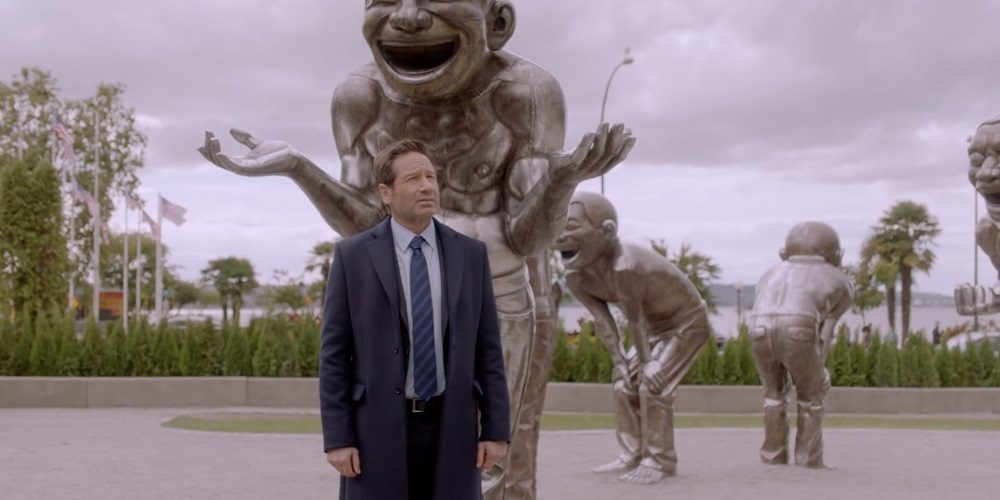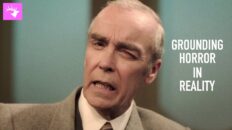“The main thing that I learned about conspiracy theory, is that conspiracy theorists believe in a conspiracy because that is more comforting. The truth of the world is that it is actually chaotic. The truth is that it is not The Iluminati, or The Jewish Banking Conspiracy, or the Gray Alien Theory.
The truth is far more frightening – Nobody is in control.” ― Alan Moore
***
The X-Files was one of the breakout series of the 90s that helped paved the way for the current serialization of television we see today. It was never very good at its serialization attempts–its mythology episodes were often among its weaker installments–but it nonetheless offered, along with contemporary series like Star Trek: Deep Space Nine, Babylon 5, and Buffy the Vampire Slayer, ongoing story lines that would weave in and out of traditional television’s typical reset button at the end of each episode. It was also, although at times campy, a deeply serious program, dealing with government conspiracies, coverups, and monsters often created by modern society.
When it occasionally did veer into its more campy impulses, its standout episodes came from writer Darin Morgan. “Humbug”, “Clyde Bruckman’s Final Repose” (for which he and guest star Peter Boyle both won Emmy awards), “War of the Coprophages”, and “Jose Chung’s From Outer Space” were darkly humorous, or humorously dark, explorations of the paranormal and conspiracy theories, often lampooning the entire premise of the series while still treating the mystery of the subject matter and the characters of Mulder and Scully with a sort of loving fondness. Morgan returned for the revival of the series, penning “Mulder and Scully Meet the Were-Monster”, probably the best episode of an otherwise lackluster season. For this season, quite possibly the series’ last with Gillian Anderson stating it will be her final time portraying Scully, Morgan again penned an episode, “The Lost Art of Forehead Sweat”.
The entire episode serves as a lampoon both of the show itself and its current revival. And along with Morgan’s typical blend of humor and compassion for his characters, exhibits a kind of melancholy poignancy, considering the current political state of the world. Ostensibly an exploration of the Mandela Effect–a way of describing a collective false memory, named after Nelson Mandela, who many recall having died in the 80s when in reality he lived until 2013–the episode has some fun exploring some of the most famous examples of the Effect. It highlights the spelling of the popular children’s book series The Berenstain Bears (which many remember being spelled Berenstein), the non-existent film Shazaam starring comedian Sinbad, and even takes a meta turn questioning the name of the effect itself, purporting it to actually be the Mengele Effect (after the infamous German World War II officer Josef Mengele). But as fascinating, and often frustratingly hilarious as the Mandela Effect is, all of that is merely set up for the real subject of the episode: the unsteady foundation of a society obsessed with conspiracy theories, distrust of the media (or more accurately any media which doesn’t reinforce previously held beliefs), and the strangely dystopian world The X-Files finds itself in that it had in some respects help to promote during its original run.
The episode follows Mulder (David Duchovny) who has been contacted by a mysterious figure, Reginald “Reggie” Murgatroid played by comedic actor Brian Huskey (Bob’s Burgers, People of Earth), trying to track down the mysterious Dr. They (“Who are they?” Mulder asks in exasperation of Reggie) who has developed a way to manipulate memories–of individuals and the public. It plays out both as a meta commentary and as an absurdly literal narrative. And that speaks directly to the tension facing our present cultural discussion. The utterly literal juxtaposed with the carnival mirror, the unending madness of the meta-metaphorical. As Mulder meets and speaks with the characters here, he is left almost helpless, pulled between an absolute meaning and the idea that meaning has no meaning, it’s only turtles all the way down, an eternal ¯\_(ツ)_/¯.
Fortunately, Morgan isn’t so cynical as to leave his script playing with just these ideas. He grounds the story in the characters and gives them real, palpable weight and shape. Reggie, it turns out, is mentally disturbed, and Scully is there to ground Mulder in the present, another human being with real thoughts, needs, passions, and a desire to share personal moments outside the either hyper-meta or overly-literal thought exercises presented. And this, despite whatever cultural memory we have of The X-Files is it’s heart and soul, the relationship between Mulder and Scully.
Still, Morgan can’t help himself and throws in one last twist, courtesy of FBI Director Skinner (Mitch Pileggi) who flings everything into question again in a short appearance, recalling the end of Umberto Eco’s Foucault’s Pendulum–a similar exploration of the absurdity of thinking the world is out to get you, there’s a conspiracy around every corner, and life is merely a game to be played. Ultimately, “The Lost Art of Forehead Sweat” acknowledges The X-Files revival as the fish-out-of-water it is, swimming in a world its original run contributed in creating with its making conspiracy theories cool, as well as asking if the point was missed, and what we can do now. If we must face nihilism, it’s worth facing sometimes with a smile and a shrug, enjoying the absurdity of it all, in between our more serious battles.









